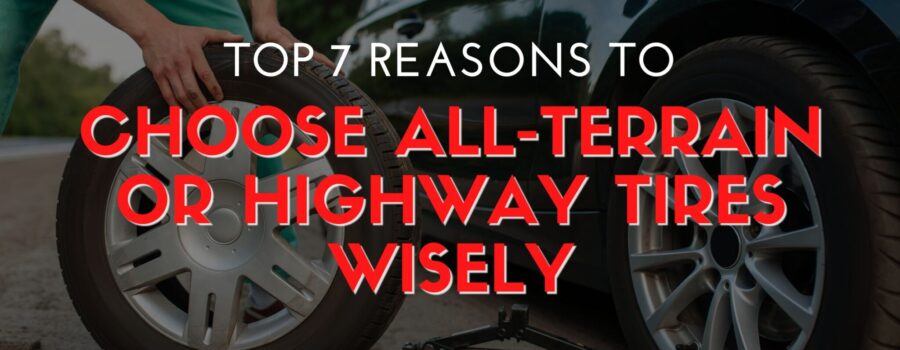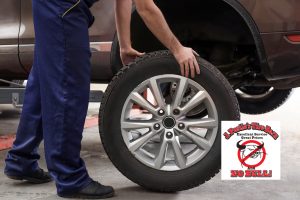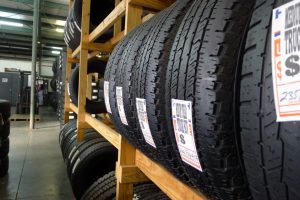Top 7 Reasons to Choose All-Terrain or Highway Tires Wisely
Choosing the right tires for your vehicle is more than just a purchase—it’s a decision that affects your safety, comfort, and budget for years to come. Whether you’re commuting on smooth highways or venturing off the beaten path, your tires need to match your driving habits and environment. In this guide, we’ll dive deep into the world of all-terrain vs. highway tires, helping you make an informed decision based on performance, durability, cost, and more.
Let’s roll into the details.
What Are All-Terrain Tires?
All-terrain (A/T) tires are built to perform both on paved roads and off-road conditions like dirt, gravel, and mud. They have:
-
-
- Aggressive tread patterns for traction on uneven surfaces
- Reinforced sidewalls to resist punctures
- Durable rubber compounds for extended lifespan
- Balanced performance between on-road comfort and off-road reliability
-
These tires are ideal for trucks, SUVs, and 4x4s frequently driven in variable conditions or light off-roading scenarios.
What Are Highway Tires?
Highway (H/T) tires are optimized for use on paved roads. Designed with comfort and fuel efficiency in mind, they offer:
-
-
- Smooth and quiet rides on highways
- Better fuel economy than A/T tires
- Long tread life when used as intended
- Superior wet and dry traction on road surfaces
-
These are best for drivers who primarily stick to interstates, city streets, or suburban areas.
All-Terrain vs. Highway Tires: The 7 Key Differences
1. Performance on Pavement
Winner: Highway Tires
Highway tires offer better traction, handling, and comfort on paved roads. All-terrain tires can feel stiffer or noisier due to their aggressive tread.
2. Off-Road Capability
Winner: All-Terrain Tires
If your weekend includes dirt trails or rugged landscapes, A/T tires are your best bet. Their tread design grips better on loose or uneven terrain.
3. Tread Life
Winner: Highway Tires (Generally)
Because A/T tires have deeper, chunkier tread blocks, they often wear faster on pavement. H/T tires, with their road-optimized design, can last longer with proper maintenance.
4. Fuel Efficiency
Winner: Highway Tires
A/T tires are heavier and have more rolling resistance, which can lower your miles per gallon. H/T tires are lighter and more fuel-efficient.
5. Noise Level
Winner: Highway Tires
Thanks to their smoother tread patterns, highway tires generate less road noise, offering a quieter ride—especially noticeable at high speeds.
6. Weather Conditions
Tie: Depends on Conditions
-
-
- Rain: H/T tires often perform better on wet roads due to optimized grooves.
Snow & Ice: Some A/T tires are “Three Peak Mountain Snowflake” rated, providing excellent winter traction. - Mild Conditions: Either can perform well depending on specific tire features.
- Rain: H/T tires often perform better on wet roads due to optimized grooves.
-
7. Cost
Winner: It Depends
A/T tires are usually more expensive upfront. However, if you frequently need off-road capability, that investment can prevent damage and improve safety. H/T tires are often cheaper and provide more value for daily road driving.
Who Should Choose All-Terrain Tires?
Consider all-terrain tires if you:
-
-
- Drive a truck or SUV and go off-road regularly
- Live in rural areas where roads are often gravel, dirt, or muddy
- Need durability for towing, hauling, or work-related driving
- Want a more rugged appearance
-
Who Should Choose Highway Tires?
Highway tires are the best option if you:
-
-
- Mostly drive on paved roads or highways
- Want a quiet, smooth ride with better fuel efficiency
- Live in a city or suburban area
- Prioritize tread life and affordability
-
Can You Use All-Terrain Tires on the Highway?
Yes—but with caveats. While A/T tires are designed to handle highways, they don’t offer the same ride comfort or fuel economy as H/T tires. You’ll experience more road noise and possibly a rougher ride.
Can You Use Highway Tires Off-Road?
It’s possible, but not advisable. Highway tires lack the tread depth and sidewall strength for off-road abuse. If you go off-road occasionally, you might want to consider all-terrain tires for safety and performance.
Common Questions About Tire Types
Q: Are all-terrain tires good in the rain?
A: Yes, but not all are equal. Look for A/T tires with siping (tiny slits in the tread) to improve grip in wet conditions.
Q: Which tires last longer—highway or all-terrain?
A: Typically, highway tires last longer when used as intended. All-terrain tires can wear faster, especially if used mostly on pavement.
Q: Can I mix all-terrain and highway tires?
A: It’s not recommended. Mixing tire types can affect traction, handling, and wear unevenly. Always match tire types and sizes for safety.
Q: Do all-terrain tires hurt gas mileage?
A: Slightly, yes. The aggressive tread and extra weight can reduce MPG compared to highway tires.
Final Thoughts: Which Tire Type Is Right for You?
Choosing between all-terrain and highway tires comes down to how and where you drive. If your lifestyle includes camping, hauling, or driving in rural environments, all-terrain tires may serve you best. But if you spend 90% of your time commuting or traveling on smooth pavement, highway tires are likely the smarter investment.
Still unsure? That’s what we’re here for.
Contact Us
Postle Tire Barn has been serving the tire and automotive needs of the Tuscaloosa and West Alabama area for more than 40 years. When it comes time to choose the right tires—whether all-terrain or highway—we’re the ones to know.
Give us a call at 205-391-0062 or email us at [email protected]. Our tire experts are here to help you find the best option for your vehicle, your lifestyle, and your budget.





Leave a Reply
Your email is safe with us.